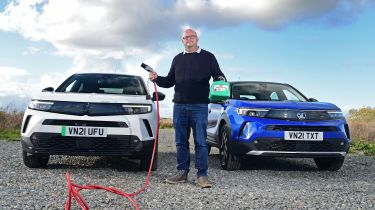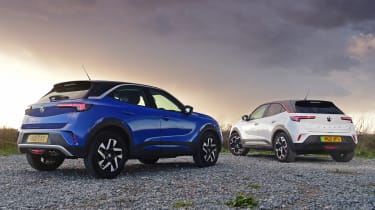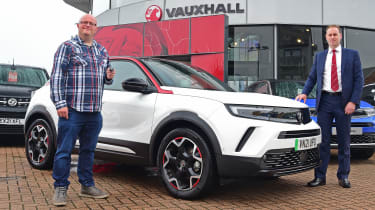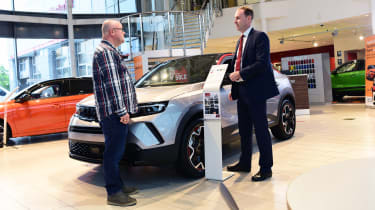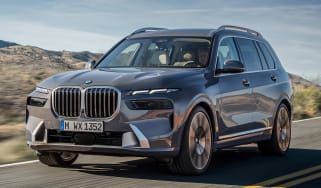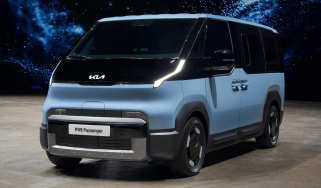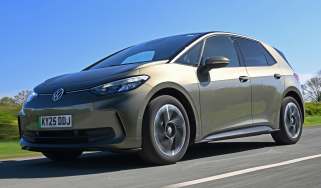Vauxhall Mokka-e: long-term test
Second report: our electric Vauxhall Mokka-e faces up against the petrol-powered version
Verdict
The Mokka-e isn’t perfect, and there are a few compromises, but in general it’s taking long and short journeys in its stride. And on balance, we’d certainly say it’s the pick of the Mokka range.
- Mileage: 4,654
- Economy: 3.9 miles/kWh
Petrol or electric? It’s a question that more and more motorists are asking. Indeed, the industry expects more plug-in vehicles will join Britain’s roads this year than during the whole of the twenty-teens.
It’s easy to see why. They’re great to drive and cheap to run, and driving a tailpipe-less car feels the right thing for me. But is it right for everyone? To find out, just as we did with the three Citroens, my Mokka-e has been joined by its petrol-engined partner.
Stellantis is one of the few firms to offer the choice of combustion or full electric power within the same model range, so the similarities in styling, practicality and comfort are clear. But with so much common ground, it’s easier to focus on the differences in powertrain – which are stark.
Smoothness is a hallmark of any EV, so it’s no surprise that the Mokka-e is superbly refined and, apart from a gear selector that won’t be rushed between drive and reverse, easy to drive around town or at speed. There’s a quiet whirr from the motor, and a little bit of road noise from the 55-profile Michelins, but it’s all really rather serene.
Used - available now

2021 Vauxhall
Mokka
33,900 milesAutomaticPetrol1.2L
Cash £15,303
2019 Vauxhall
Mokka
35,753 milesAutomaticPetrol1.4L
Cash £12,000
2019 Vauxhall
Mokka
37,133 milesAutomaticPetrol1.4L
Cash £11,203
2024 Vauxhall
Mokka
38,122 milesManualPetrol1.2L
Cash £15,703The gear selector has the same lethargic tendencies in the petrol Mokka, too, which makes it a little more stressful than it needs to be when executing three-point turns.
The biggest difference, unsurprisingly, is the powertrain. We know the 1.2-litre turbo is a peppy little performer, offering decent punch and refinement, but against the near silence of the EV, the thrum and vibration from the three-cylinder are pronounced.
It’s a similar story with the car’s start-stop system. Step into a Mokka from pretty much any other combustion car, and you’ll be satisfied, but I found it a little too eager to kill the engine. Again, it highlights just how smooth the Mokka-e is to drive in town.
It’s not always easy to come close to official fuel consumption figures, but over a mix of roads without really trying, the 1.2-litre triple returned 40.1mpg – about seven miles per gallon off the official mark.
On mainly urban roads, the Mokka-e is returning an average of 3.9mi/kWh, which equates to its 50kWh battery delivering 190 miles of range – pretty much what the car suggests after a full charge. However, that estimated range diminishes by about 1.5 miles for every mile travelled during longer motorway cruises at around 60-65mph.
But on balance, I’ll take the improved refinement at the expense of range any day, even if that has put me at the mercy of the public chargepoint network recently. In the past five attempts to charge, I’ve hit problems with BP Pulse, Pod Point and Ecotricity, but Instavolt has been deeply impressive with its reliability and general ease of use. Here, a top-up from 15-80 per cent took a little over half an hour using a 50kW charger.
While the standard kit list on “my” SRi Nav Premium was broadly similar to the blue Elite Nav Premium, there were some notable differences. The most obvious is revealed the moment you open the door: the light-coloured seats and headliner in the petrol Mokka make the interior look more spacious than my black-trimmed Mokka-e. But even this can’t overcome the lack of an interior roof light in the rear, something that could be a right pain for young families trying to wrestle kids into their child seats.
Many buyers might be tempted by darker upholstery because it covers a multitude of sins, but in the small Mokka, it certainly feels like lighter is the smarter choice.
Several hundred miles with the blue car also highlighted that a loose strip of trim under the infotainment screen of my car isn’t one of the Mokka’s character traits, as I’d previously thought. When I rest my thumb on the red panel to operate the touchscreen, the trim bows inward, so a trip to the local dealer is on the cards.
Vauxhall Mokka-e: first report
The electric Vauxhall Mokka-e crossover joins our fleet and is quick to impress
- Mileage: 2,816
- Efficiency: 4.2 miles/kWh
As transformations go, it’s a big one. The old Vauxhall Mokka was a middling model at best, yet it was a big seller, thanks in no small part to an eye-catching price tag.
Trouble is, trading on price is hard. Fast forward to 2021 and there’s a new Mokka in town, and it’s made huge advances in all the key areas. All except price, because Vauxhall has walked away from heavy discounting.
So I’m living with one for the next six months to find out if it’s a premium worth paying, but first things first. It’s quite a looker, isn’t it? The Vauxhall Vizor nose, the Viva-aping crease along the bonnet, and the trim around the window line (which hides excess bulk) all give it a sleeker profile that makes it stand out. I really like the black badge treatment front and rear, which looks great against the optional White Jade paint.
It’s not the only striking colour offered to Mokka-e buyers – something that Tony Le Voi’s Group Sales Director, Geoff Champion, explains, pointing to a Mamba Green model in his Thurrock, Essex, showroom.
Geoff showed me round the car. SRi Nav Premium is one of four trims in the all-electric Mokka-e range. Ours is the only one in the line-up that sports the red trim, and is expected to be the biggest seller.
Interestingly, only £415 splits the top three trims, so whether you choose SRi Nav Premium, Elite Nav Premium or Ultimate Edition will largely depend on whether you prefer a slightly sporty, upmarket, or more tech-laden look and feel. But whichever you go for, there’s little need to dig deep into the options list. SRi Nav Premium bundles together a 10-inch Navi Pro infotainment system that’ll be familiar to owners of recent Citroens, alongside a 12-inch digital instrument cluster, a heated steering wheel and automatically folding door mirrors.
That’s in addition to Apple CarPlay and Android Auto connectivity, driver drowsiness alert, traffic-sign recognition, adaptive cruise control and a rear parking camera that’s fitted across the range. The only option on our car is White Jade paint – something that sticks in the craw, given how white and non-metallic red were traditionally the no-cost colours; today it’s a handsome dark silver that’s the “free” shade. Still, outside the rain-soaked showroom, the Mokka-e cuts a dash, and to my eyes this white is the pick of the paint palette.
Geoff showed me the car’s features, but, truth be told, nothing is overly complex. The touchscreen is pretty responsive, the digital display is easy to configure, and it’s simple to see the state of charge in the battery.
The Mokka-e’s charging tech is good, too. It takes 7hr35m to charge from 0-100 per cent from a 7kW wallbox, or 5hr5m from a 22kW charger. Find a CCS rapid charger rated at 50kW, and that time drops to 45 minutes for a 0-80 per cent charge, or just 30 minutes from a 100kW charger. As with most EVs that share their architecture with combustion models, the charge port is located where the fuel flap would be, but it’s frustrating not to have any dedicated cable storage, or even a false floor to tuck the cable out of sight. As the winter approaches, this might become more of a problem.
On the road, first impressions are encouraging. The Mokka-e drives smoothly and quietly, performance is sprightly, and the cabin is attractive, if a little dark thanks to the black headlining and heavily tinted windows. A bonus is that my kids like it, too. Despite the high-set window line, they have a good view out, so the car looks sure to be another all-electric family favourite.
So far, I’ve recorded a maximum range figure of 191 miles with the battery at 100 per cent, just 10 miles down on Vauxhall’s claim, and mainly in Eco mode – one of three drive settings. With the two-stage brake regeneration at maximum attack, the estimated range generally goes down by one mile per mile travelled. That gives a bit of confidence in a car with a WLTP-certified range that’s a bit down on some of its rivals.
| Model: | Vauxhall Mokka-e Sri Nav Premium |
| On fleet since: | September 2021 |
| Price new: | £32,435 |
| Engine: | Single motor/50kWh battery, 134bhp |
| CO2/tax: | 0g/km/£0 |
| Options: | White Jade paint (£320) |
| Insurance*: | Group 22E/Quote £545 |
| Mileage/mpg: | 4,654 |
| Test efficiency: | 3.9 miles/kWh |
| Any problems? | Loose interior trim |
| Star rating | 4 |
*Insurance quote from AA (0800 107 0680) for a 42-year-old in Banbury, Oxon, with three points.

